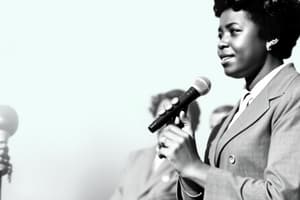Podcast
Questions and Answers
What was Ida's primary motivation for her journalism?
What was Ida's primary motivation for her journalism?
- To discover her true identity (correct)
- To gain personal fame and recognition
- To promote racial injustices
- To engage in literary criticism
How did Ida respond to the lynching of her friends?
How did Ida respond to the lynching of her friends?
- She wrote articles condemning lynching (correct)
- She moved to another city immediately
- She joined a local political party
- She started a national memorial for them
What action did Ida take to further the suffrage movement?
What action did Ida take to further the suffrage movement?
- She wrote a book on suffrage
- She led protests against lawmakers
- She secured funding for campaigns
- She created the Alpha Suffrage Club (correct)
What significant event did Ida participate in on March 3, 1913?
What significant event did Ida participate in on March 3, 1913?
What challenges did Ida face as a journalist in Memphis?
What challenges did Ida face as a journalist in Memphis?
Why did the organizers of the March 3 parade tell Ida to march at the back?
Why did the organizers of the March 3 parade tell Ida to march at the back?
What was a significant outcome of the Illinois suffrage movement during Ida's activism?
What was a significant outcome of the Illinois suffrage movement during Ida's activism?
What happened to the office of The Memphis Free Speech in 1892?
What happened to the office of The Memphis Free Speech in 1892?
How did Ida B. Wells-Barnett's life change when she was sixteen years old?
How did Ida B. Wells-Barnett's life change when she was sixteen years old?
What was the main reason Ida B. Wells-Barnett initially wrote articles for local newspapers?
What was the main reason Ida B. Wells-Barnett initially wrote articles for local newspapers?
What impact did the Emancipation Proclamation have on Ida B. Wells-Barnett's family?
What impact did the Emancipation Proclamation have on Ida B. Wells-Barnett's family?
What was the main reason Ida B. Wells-Barnett's parents died?
What was the main reason Ida B. Wells-Barnett's parents died?
What did Ida B. Wells-Barnett do after being forcibly removed from the train?
What did Ida B. Wells-Barnett do after being forcibly removed from the train?
What did Ida B. Wells-Barnett do to keep her siblings together after their parents' death?
What did Ida B. Wells-Barnett do to keep her siblings together after their parents' death?
What is the significance of the quote "The way to right wrongs is to turn the light of truth upon them."?
What is the significance of the quote "The way to right wrongs is to turn the light of truth upon them."?
What did Ida B. Wells-Barnett initially do to overcome the racism she faced on the train?
What did Ida B. Wells-Barnett initially do to overcome the racism she faced on the train?
Flashcards
What is an epidemic?
What is an epidemic?
A serious outbreak of disease that spreads rapidly.
Explain racial discrimination.
Explain racial discrimination.
A form of discrimination based on race, specifically targeting people of African descent.
What is the Emancipation Proclamation?
What is the Emancipation Proclamation?
In 1863, President Lincoln issued this proclamation, freeing enslaved people in Confederate states.
What does it mean to be 'illegally detained'?
What does it mean to be 'illegally detained'?
Signup and view all the flashcards
Who was Ida B. Wells-Barnett?
Who was Ida B. Wells-Barnett?
Signup and view all the flashcards
Define segregation.
Define segregation.
Signup and view all the flashcards
What is a 'black-owned newspaper'?
What is a 'black-owned newspaper'?
Signup and view all the flashcards
How did Ida B. Wells-Barnett become an activist?
How did Ida B. Wells-Barnett become an activist?
Signup and view all the flashcards
Lynching
Lynching
Signup and view all the flashcards
How did Ida fight against injustice?
How did Ida fight against injustice?
Signup and view all the flashcards
What was Ida's tool for exposing lynching?
What was Ida's tool for exposing lynching?
Signup and view all the flashcards
What did Ida do after leaving Memphis?
What did Ida do after leaving Memphis?
Signup and view all the flashcards
How did Ida fight for women's suffrage?
How did Ida fight for women's suffrage?
Signup and view all the flashcards
How did Ida defy segregation?
How did Ida defy segregation?
Signup and view all the flashcards
What happened in the suffrage parade?
What happened in the suffrage parade?
Signup and view all the flashcards
Study Notes
Ida B. Wells-Barnett Biography
- Born July 16, 1862 – March 25, 1931
- Orphaned at 16 after family's yellow fever death
- Father of mixed ancestry (slave mother, white owner)
- Mother was part African American, part Native American
- Freed by the Emancipation Proclamation
- Family divided after parents' death; she took charge
- Became a teacher and later a journalist
- Became a prominent anti-lynching activist, journalist, and suffragist
Early Life and Family
- Faced family hardship and division after yellow fever epidemic
- Became a teacher, commuting by mule
- Commuted to teach; family reunification was a priority
- Faced racism in Memphis in 1884; refused to sit in "colored car"
- Sued the railroad and won
- Became a newspaper contributor, fighting against racial injustice
- Mother was a cook, father a carpenter; aided in establishing a university for freed slaves
- Sought education; considered an eighteen-year-old to teach at a school
- Experienced racism through segregation on a train
Activism and Journalism
- Ida became a journalist and activist, focusing on racial injustice
- Became a contributor to the The Evening Star newspaper
- Ida's writing protested against racial segregation, injustice, and lynching
- Writing exposed lynching atrocities and racism, urging the public to address the wrongs
- Ida used journalism to bring light to societal wrongs
Lynching Activism
- Focused on combating lynching, a brutal act against African Americans
- Her outspokenness resulted in threats and danger
- Three friends were brutally lynched; her activism was directly spurred by this
- She wrote about the injustice of lynching, highlighting the brutality and racism involved
- Brought awareness to the societal injustice of lynching
- Became a prominent voice against the injustice through writing
Suffrage and Legacy
- Became involved in the women's suffrage movement
- Formed the Alpha Suffrage Club
- Was concerned that African American women were not involved in national suffrage
- Became the first black women's suffrage association founder
- Worked with other suffrage figures during the 1913 parade in Washington, D.C.
- Her activism continued to raise awareness and promote change
- Later married attorney Ferdinand Barnett; continued her work as an activist and journalist
- Her work advanced women's suffrage and rights
- She fought for racial equality and justice throughout her life
- Her work had lasting impacts on society
Studying That Suits You
Use AI to generate personalized quizzes and flashcards to suit your learning preferences.




